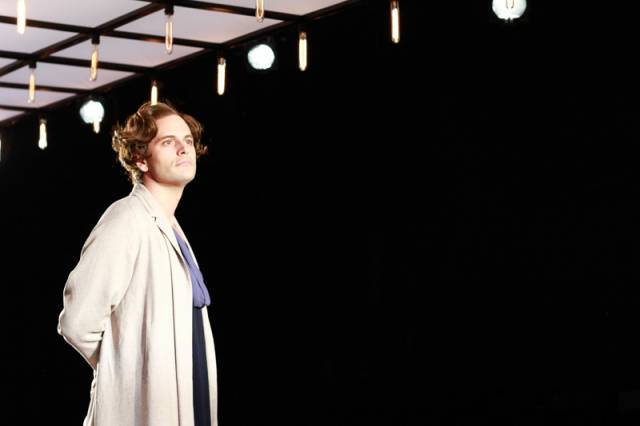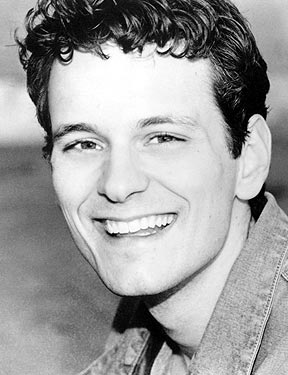

Some stories linger in the incubation stage. Patiently—or not so patiently—they wait to be told, to make their way into the public consciousness. Then, uncannily, when they finally burst into daylight, they show up in multiple iterations.
The tale of Danish-born Lili Elbe (1882-1931) is one such story.
Bixby Elliot’s new play Sommerfugl tells the true story of Elbe (born Einar Wegener), who is believed to be the first person ever to undergo gender-reassignment surgery (accomplished in a series of operations in Germany in 1930-31). Elliot developed his script over a period of years, and the play premieres in New York City this month in a production by InViolet Theater, staged at the 4th Street Theater. Stephen Brackett (Buyer and Cellar) directs.
But then, a little more than two months later (on November 27th), a motion picture called The Danish Girl will open in Los Angeles and New York City (it will then go into wide release in December). Based on the 2000 novel by David Ebershoff, the film—directed by Tom Hooper and featuring Eddie Redmayne in the title role—also tells the story of Einar and Lili.
Elliot has never read The Danish Girl, although he says a copy of the novel lay unread in his home for years—a gift from his partner’s aunt. He came to learn of Lili when he was planning a larger play about transgender issues. Often Elliot’s plays (which include Girl You Know It’s True and Abraham Lincoln Was a Faggot) juxtapose multiple stories, clustered around a theme or issue. Elliott envisioned a “gigantic” play that presented Lili’s story alongside other scenarios, including one about 21st-century schoolchildren choosing to use restrooms not matching their presumed gender, and another about an all-transgender rock band. The more he wrote, however, the more he found himself concentrating on the story of Lili’s groundbreaking transformation.

“I got less and less interested in the other stories,” he explains. “And finally a friend of mine said, ‘You know, a play doesn’t have to be about three different things, Bixby. You can write about just one thing.’” Elliot resisted at first—those multi-story plays were becoming a sort of artistic hallmark for him. But finally he decided to tell Lili’s story in a simple, stand-alone drama. And thereby Sommerfugl (the word means “butterfly” in Danish) began preparing for flight.
InViolet, to which Elliot belongs, is an actor-based company whose mission includes encouraging performers to branch out into writing and directing. The playwright took the script to the company’s annual retreat in rural Pennsylvania where it was given its first reading. “People had a very strong reaction to the play,” he says. “It was decided very quickly…to do a production for this fall.” Elliot credits InViolet with giving him a safe space in which to develop this tricky, risky material. “I really, truly feel that, with this play, if I hadn’t had InViolet, it would have been a play that just stayed in my drawer, because it sort of…scared me.”
Sommerfugl concentrates on the relationship of Einar Wegener and his wife, Grete, both of whom were painters in Denmark. Grete encourages her husband to investigate the most deeply hidden part of his psyche, which quickly manifests itself as Lili. At its core, the play is a tender love story.
The historical information available about the real-life Einar/Lili and Grete was extremely limited. Elliot (like Peter Ebershoff before him) had plenty of room to fill in the particulars of the Wegners’ marriage with his own imagination. He and his partner, casting director Paul Davis, traveled to Copenhagen to visit members of Davis’ family, and, while there, Elliot was able to do research on Lili at the Royal Danish Library and also to visit the exact location where an exhibition of Einar Wegener’s paintings was held after the artist’s transition.
When it came time to cast the play, Elliot was determined to have a transgender actor portray Lili. He and Davis contacted agents, posted a notice in Backstage, and consulted other theaters that had cast transgender performers. They were disappointed that there was so little interest. In fact, only two transgender actors were auditioned for the part, neither of whom was right for the role.
“Unfortunately,” says Elliot, “the part is so specific. It calls for someone who is in their mid-thirties and who is relatively European looking…. It was really hard for me, because I had been so passionate about casting somebody transgender. And I worry that the transgender community will feel that I’ve done a disservice to the play by not casting them. But we really made every effort to do that.”
Instead, the role of Lili went to Wayne Alan Wilcox, known for his recurring role as “Marty” on television’s Gilmore Girls, as well as for his performance as David in Broadway’s The Normal Heart.

Wilcox sees the role as a departure from his other work, and a challenge for all involved. “It’s kind of daunting because it’s topical,” he says, “and we want to get it right.” Wilcox says that, in rehearsals, he, director Brackett and the other cast members (including Aubyn Philabaum, who plays Grete) have all striven to concentrate on the simple human story of Lili and Grete. They’ve avoided the temptation to weigh the production down with 2015 gender politics.
“I don’t want the politics of the country we live in right now to dictate the way we tell this story,” he elaborates. “I would like it to be the other way around. I would like this story to add to the conversation of the politics of our day, specifically to LGBT rights, and even more specifically to transgender rights.”
To that end, several audience talk-backs have been scheduled, to follow Sommerfugl performances.
But how does it feel to be presenting this play, knowing that a potential film blockbuster looms that will tell a similar version of the story? Elliot—who has viewed a Danish Girl trailer and was impressed with it— has mixed feelings about the prospect:
“On bad days I’m, like, Why is there a major motion picture coming out about the [story] I just wrote? And then, on other days, I get really excited, because I think Lili Elbe would just be amazed by this moment she’s having, right? And she’d be thrilled that [our] society is having a conversation about transgender issues.”
Performances of InViolet Theater's Sommerfugl continue through October 10 at the 4th Street Theatre.